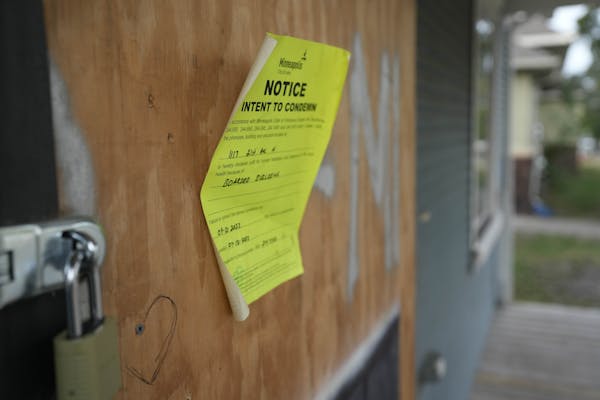Residents of a deteriorating elder housing complex in south Minneapolis have begun to protest outside their home, urging management to address hazards like broken heaters, unrepaired smoke damage and recurrent burglaries — and highlighting a growing crisis for nonprofit landlords operating deeply subsidized housing in the Twin Cities.
At the Bii Di Gain Dash Anwebi apartments at East 24th Street and Bloomington Avenue, residents have complained about shivering without heat in the winter, and suffering breathing problems without air conditioning in the summer heat. Thieves have stripped community rooms down to the silverware, and tenants feel unsafe, said elder advocate Joy Rivera of the Division of Indian Work.
Leaders of the American Indian Community Development Corporation (AICDC), which co-owns the complex with CommonBond Communities, acknowledge that security problems in the neighborhood have become untenable. But like many nonprofits operating in communities ravaged by fentanyl and homelessness — and where a depleted police force has less reach — the cost of private security is consuming their operational budget.
At Bii Di Gain, property managers keep turning over, and in-house maintenance crews have become impossible to staff, said Mike Goze of the AICDC.
In a statement, CommonBond Communities said Bii Di Gain "is operating at an unsustainable deficit" as a result of deferred maintenance, lower rent revenues and the ever-climbing expenses.
"We've lost $90,000 this year in nine months," Goze said.
The same pressures forced Hope Community to close the Dundry — a 25-unit apartment for formerly homeless people in East Phillips — this August after the pipes were stolen out of the building. And in north Minneapolis, Urban Homeworks vacated an apartment building at 21st and Emerson avenues after it became a drug market.
Will Delaney, interim director of Hope Community, said he supports residents' right to point out problems in their homes, but notes that the challenges facing affordable housing providers go beyond a single building or landlord.
"At a recent gathering of most of the big nonprofits, every single one is either in process or considering selling some of their affordable housing right now because they can't sustain it," he said. "We are seeing that we were kind of the canary in the coal mine, that we are far from the last."
A Perfect Storm
Testifying at the Legislature in March, CEOs Paul Williams of Project for Pride in Living and Deidre Schmidt of CommonBond said they, along with Catholic Charities and Aeon, have documented a combined loss of $60 million after the compounding crises of the past three years.
By providing subsidized housing to Twin Cities families taking home less than $20,000 annually, they're keeping tens of thousands of deeply poor people out of homeless shelters and encampments. But rising costs of insurance, utility fees, property taxes and security, coupled with the inability of some residents to pay rent, have drained reserves.
"We know this trend will continue for at least the next several years, and we simply cannot sustain additional millions of losses," Williams said.
CommonBond has collected $7 million less in rent than projected since 2020, said Schmidt. At the same time, property insurance and security have risen more than 40%, and property taxes by nearly 30%.
Those costs have obliterated the 2% increase in rental income and 3% increase in expenses that lenders have traditionally expected of affordable housing projects.
In May, the Legislature approved a historic $1 billion housing bill that included $50 million in one-time funding to tide over nonprofits until property tax reform for affordable housing begins in 2025. But the money won't be disbursed until next year.
"Something needs to shift," said Shannon Jones, who teaches neighborhood revitalization at the University of Minnesota. "There is a lot of money out there right now for new [construction] because we need more housing ... but there is a hole that many of the organizations have gotten into trying to figure out how to keep their buildings safe."
Damaged Trust
At Bii Di Gain, years-long challenges boiled over this summer, said resident Charlene Toal, 70.
"You couldn't even park in front because the weeds were knee-high," she said. "I don't know how many times we had to change the locks because the workers kept losing the keys. I kept going in there saying the handicap button's not working, but they'll ignore it for two or three months."
Gladys Sandland, 74, said the constant turnover of property managers damaged trust and communication, preventing donations from outside organizations from reaching residents.
For years, she and her neighbors relied on deliveries of milk, eggs and juice from East Side Neighborhood Services, while Bluebirds and Blooms would send flower bouquets to lift their spirits. But recently Sandland said she's seen the flowers wilting in Bii Di Gain's office, not having been distributed. East Side stopped bringing donations this summer.
In June, the U.S. Department of Housing and Urban Development visited Bii Di Gain and found several "serious deficiencies" including damaged doors and fencing, leaking central water supply, mold-damaged walls and overgrown vegetation. Inspectors ordered CommonBond to make repairs within 60 days or risk losing federal rental assistance.
CommonBond certified that all the repairs had been made by Nov. 3 — though residents dispute that claim. HUD spokeswoman Ashlee Strong said the agency accepted CommonBond's declaration and likely will not re-inspect Bii Di Gain before next June.
This summer CommonBond announced that third-party contractor Marsden would take over maintenance of the property.
"We are committed to working hard — in partnership with American Indian Community Development Corporation — to ensure the issues identified by residents are addressed, and to limit the impact that operational challenges have on residents," said CommonBond spokeswoman Katie Selph.
Toal, Sandland and neighbor Florence Red-Cloud, 78, have filed rent escrow actions, pressuring the landlord to make comprehensive repairs. Their complaints also allege discrimination: that a staffer had called residents "my little Indians," and that management walked out of a meeting to discuss deferred maintenance after tenants invited non-resident relatives and advocates to attend.
On Nov. 9, the city of Minneapolis posted a yellow notice on Bii Di Gain's door, indicating that its rental license had been expired since March. CommonBond renewed it that same day, but not having an active rental license for the preceding eight months meant it could not legally collect rent during that period. Regan Reeck, the tenants' organizer, said they are contemplating how to proceed.
North Oaks withdraws request for density exemption from Met Council

Attorney Tayler Rahm wins GOP backing in battleground Second District

Civil War group honors the last Union veteran buried in each Minnesota county
Boy, 16, shot at YMCA in Coon Rapids

